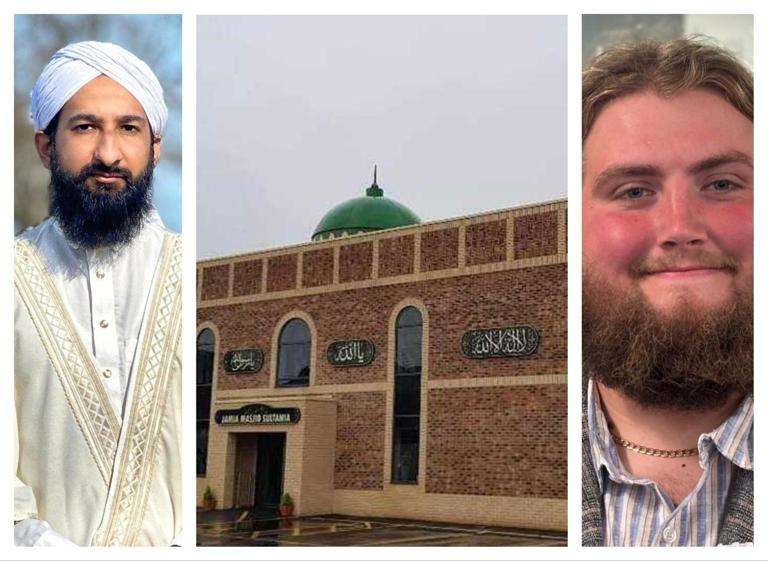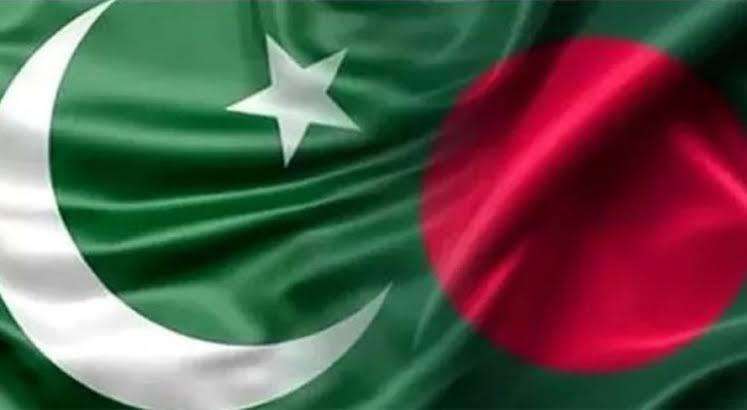Bangladesh-Pakistan social and cultural connectivity that lost momentum during Sheikh Hasina’s dictatorial regime between 2009 and 2024 is expected to revive in the new environment, said policymakers, diplomats and business leaders.
Bangladesh-Pakistan relations that suffered heavily during the last 15 years are likely to improve in the coming days, according to economists, politicians and policy makers.
The relation with Pakistan reached a historic law during the last 10 years as the Bharatiya Jatiya Party (BJP)-- as the religious political party—has been in power in New Delhi since 2014.
The BJP seems to have persuaded Sheikh Hasina, the ousted dictator Prime Minister of Bangladesh, to maintain rivalry and hostility with Pakistan during the last 10 years.
Pakistan Prime Minister Muhammad Shehbaz Sharif called Chief Adviser Professor Muhammad Yunus over telephone on Friday, congratulating him on his assumption of the leadership of the Interim Government of Bangladesh.
The Pakistan Prime Minister expressed his best wishes to the Chief Adviser and hoped that the goodwill between the two South Asian countries would be translated into substantial cooperation for the benefit of their peoples.
Chief Adviser Prof Yunus thanked Pakistan Prime Minister Sharif for the phone call and the congratulatory message received from him following his swearing-in as the Bangladesh Chief Adviser after a student-led revolution, the chief adviser's press wing said.
He also thanked the Pakistan Prime Minister for sending a message conveying sympathy and solidarity of the people of Pakistan for the flood victims of Bangladesh.
Sharif expressed his willingness to provide support for the people affected by the floods in southern and southeastern parts of Bangladesh.
He emphasized the need to revitalize relations between the two nations, saying there remains immense potential in expanding bilateral trade and economic cooperation.
The Pakistan Prime Minister underscored the necessity to resume mechanisms like foreign secretary-level consultations and the Joint Economic Commission between Dhaka and Islamabad.
He also stressed the need for reinvigorating the SAARC process.
The Chief Adviser said he is committed to revitalising SAARC as a top regional forum to boost ties among the South Asian nations.
He highlighted the necessity of holding regular SAARC summits and stressed holding even a brief meeting among the heads of state and governments of the SAARC states at the earliest convenience.
Prof Yunus also called for strengthening economic ties and people-to-people connections between the two nations.
Meanwhile, Mahfuzur Rahman, former Deputy High Commissioner to Pakistan, while talking to this correspondent said that the political will of Bangladesh and Pakistan will improve social and cultural relations between the two countries. Though the trade between two South Asian countries is below one billion US dollars, business leaders of the two countries can work under new environment to increase to the tune of 2 billion US dollars in few years. He, however, has expressed his views that Pakistan should condemn the 1971 genocide and give proper compensation to Bangladesh. He also shared his thoughts that the new generation of Pakistan have interest about Bangladesh that has attained enviable economic success in the last 50 years. On social and cultural relations, political leaders of both countries should ease the visa process that suffered during 2009-2024.
Bangladesh government will send Md Iqbal Hussain Khan, ndc as the next Bangladesh high commissioner to Pakistan—an experienced and a highly competent diplomat—who is expected to work hard to develop relations with Islamad on a win-win basis.
Md Iqbal Hussain Khan, a brilliant diplomat of the 20th BCS Foreign Affaires Cadre, is expected to start his diplomatic career in Pakistan soon.
Md Iqbal Hussain Khan, now Director General of the Foreign Service Academy, said that like EU and ASEAN countries, South Asian countries would work together closely to emerge as a prospective, progressive and resourceful countries to come out of poverty, hunger and malnutrition.
Imran Saeed Khan, a business leader and commercial consultant of S&W Seed Company in Pakistan said “ The young generation of Pakistan are eager to develop social and cultural relations with Bangladeshi youths. The economic and social development of Bangladesh over the last 50 years has created an interest among the young generation of Pakistan. “said a Pakistani businessman.
The young generation of Pakistan condemned the killing of The military dictator General Agha Muhammad Yahya Khan, known as Yahya Khan and his cohorts and genocide committed in 1971, Imran Saeed Khan, a business leader and commercial consultant of S&W Seed Company in Pakistan.
Agha Muhammad Yahya Khan (4 February 1917 – 10 August 1980) was a Pakistani army officer, who served as the third president of Pakistan from 1969 to 1971.
Agha Muhammad Yahya Khan is known as ‘butcher’ to Bangladeshis as he was mastermind of genocide committed in 1971.
Meanwhile the Bangladesh -Pakistan trade that are expected below potential levels can flourish in the coming days as the political leaders of both countries have reiterated commitment to increase their engagement.
The Russia-Ukraine war, political and economic mess in Pakistan and economic crisis in Bangladesh during the later part of Sheikh Hasina’s rule stand in the way of promoting trade between two countries, said economists and business leaders.
Sources said Bangladesh-Pakistan trade crossed the 1.00 billion US dollar mark during 2021, but later dropped to nearly 800 billion US dollars, sources in Dhaka and Islamabad said.
While talking to this correspondent, leaders of the Federation of Bangladesh Chambers of Commerce and Industry and Chittagong Chambers of Commerce and Industry said that business leaders of Bangladesh will work to increase trade with Pakistan.
A BGMEA leader said that Bangladesh can increase import of textiles and cotton from Pakistan reducing dependence on China and India provided Islamabad ensures competitive prices, quality and delivers goods in time. He has laid emphasis on direct air connectivity between Dhaka and Karachi to help grow the business.
He also laid emphasis on speeding up and easing visa process , specially business visas indicating political will of the both countries.
Meanwhile, Adviser for the Ministry of Textiles and Jute Brigadier General (retd) Sakhawat Hossain today sought Pakistani investment in Bangladesh's textile and jute sectors.
"Pakistani investors can come forward to invest in the closed state-owned textiles and jute mills in Bangladesh … They can invest in other sectors as well," he said when Pakistan High Commissioner to Bangladesh Syed Ahmed Maroof made a courtesy call on him at his Secretariat office.
Commending local jute-made golden bags, the Pakistani envoy expressed his eagerness to invest in Bangladesh jute and textile mills.
The Pakistani diplomat also gave an invitation to Bangladesh to participate in the Textile Expo in Pakistan, scheduled to be held in October.
Stressing on enhancing commercial relations between the two countries, Textile and Jute Secretary M Abdur Rauf said Pakistani traders can import diversified jute goods from Bangladesh as more than 200 diversified jute goods are being displayed at the Jute Diversification Promotion Center (JDPC) under the ministry.
Apart from this, the Pakistani high commissioner proposed launching direct shipping transport between Pakistan and Bangladesh.
"The system will help to take forward the eco-social relations of the two countries," he said.
To materialise the goal, he said, Bangladesh Shipping Corporation and Pakistan Shipping Corporation can jointly work to this end.
Meanwhile, Pakistani High Commissioner in Dhaka Syed Ahmed Maroof called on Adviser for Posts, Telecommunications, and Information Technology Nahid Islam at the latter's office recently.
During the meeting, they discussed on various issues including cooperation in media, sports, youth and culture and information technology, a press release said.
The Pakistani High Commissioner prayed for the eternal peace of the departed souls of those who were killed in the recent student-led mass-uprising.
He also supported the interim government of Bangladesh saying that Pakistan is keen to establish relations with Bangladesh.
The envoy hoped that Bangladesh and Pakistan can work jointly in the field of information technology.
In the second week of September, the high commissioner invited the adviser to the Urdu department of Dhaka University.
He also invited Nahid to attend another event of 'Qawwali song' to be held at the initiative of the Pakistan High Commission.
Nahid, also adviser for information and broadcasting, said: "We are interested in developing relations by solving the issues of 71 for national interest."
The Pakistani High Commissioner said: "We want to solve the 1971 issue."
"But the previous government did not give us any opportunity to discuss and kept the 71 issue alive. It could have been resolved long ago," he added.
Meanwhile, Bangladesh Nationalist Party (BNP) wants to increase bilateral and regional cooperation with all countries maintaining a level playing field.
The party made the observation after a meeting between BNP Secretary General Mirza Fakhrul Islam Alamgir and Pakistan High Commissioner to Bangladesh Syed Ahmed Maroof at the BNP chairperson's Gulshan office here on August 23, 2024.
Bilateral issues, including trade and business between the two countries, and regional cooperation came up for discussion in the around one-hour meeting.
BNP Standing Committee Member Amir Khasru Mahmud Chowdhury and Special Assistant to the BNP Chairperson's Foreign Affairs Advisory Committee Member Shama Obaid were present at the meeting.
Briefing reporters about the outcomes of the meeting, Amir Khasru said they discussed the bilateral issues between the two countries.
"Everything between the two countries, including trade and business, and economic relations have come up for discussion," he said.
Amir Khasru said there was discussion about taking the bilateral ties forward, protecting the two countries' independence and sovereignty, and upholding mutual respect and dignity.
"The issue of our regional cooperation in the entire South Asia was also discussed. The potentials between the two countries, particularly trade and business and economic prospects, were discussed," he said.
The BNP leader said actually business based on comparative advantage, which was missing in Bangladesh for a long time, was discussed.
He said there was patronization in particular business here, which benefited some individuals in terms of the bilateral trade and business.
"There was no level playing field. We have discussed that there is going to be a level playing field in Bangladesh and we will cooperate based on comparative advantage, maintaining the level playing field between the two countries," he said.
Talking about regional cooperation, he said the issue of strengthening regional cooperation within South Asia was also discussed.
Noting that the South Asian region is the least integrative area, Amir Khasru said it needs to enhance the integration in this South Asian region not just in case of economic issues but in all aspects. "It has been discussed in detail how we can move forward," he said.
"We want to move forward on the basis of BNP's foreign policy -friendship with all. We want to move forward with all kinds of economic cooperation amid good relations between the two countries," he added.
He mentioned that they will take forward the bilateral and regional cooperation by maintaining the level playing field.
_7.jpg)


_9.jpg)




.svg)
